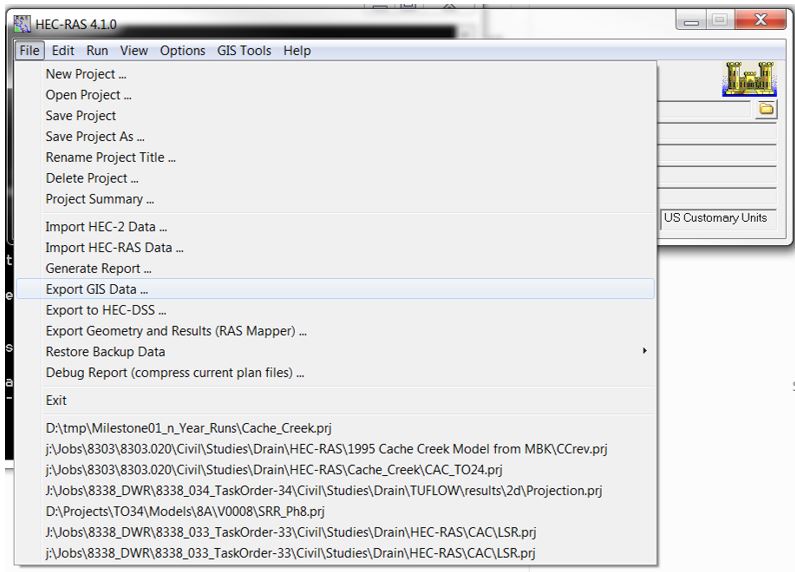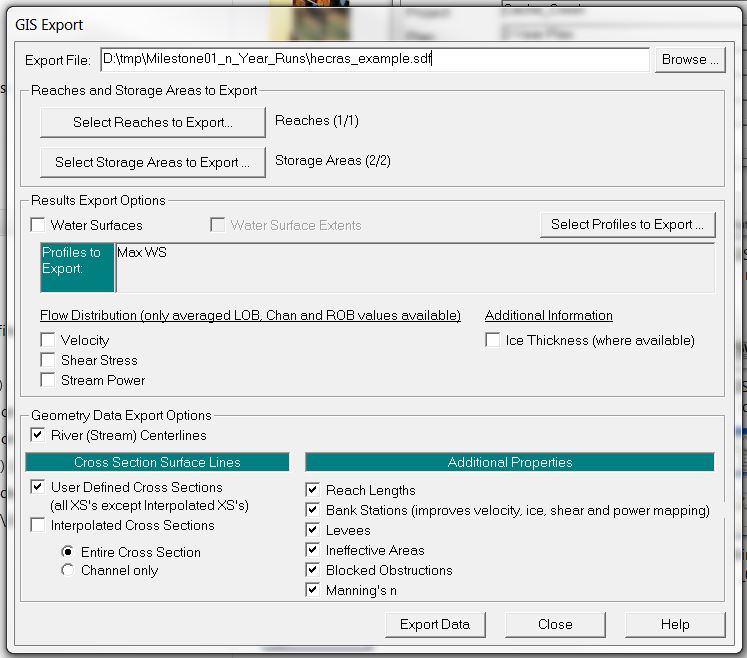Difference between revisions of "HEC-RAS to TUFLOW"
Chris Huxley (talk | contribs) |
Chris Huxley (talk | contribs) |
||
| Line 15: | Line 15: | ||
[[File:HECRAS_SDF_Export.JPG|600px]] | [[File:HECRAS_SDF_Export.JPG|600px]] | ||
| + | |||
| + | <br> | ||
| + | Select the following items within the GIS Export window: | ||
| + | *River (Stream) Centerlines | ||
| + | *User Defined Cross Sections | ||
| + | *Entire Cross Section | ||
| + | *Reach Lengths | ||
| + | *Bank Stations | ||
| + | *Levees | ||
| + | *Ineffective Areas | ||
| + | *Blocked Obstructions | ||
| + | *Manning's n | ||
| + | <br> | ||
| + | |||
| + | [[File:HECRAS_SDF_Selection.JPG|600px]] | ||
== Utility Description == | == Utility Description == | ||
Revision as of 05:14, 5 February 2015
Introduction
This page contains a brief introduction to the methods of converting HEC-RAS model inputs into a format which compatible with TUFLOW. If you have any suggestions to be included in these pages, please email support@tuflow.com.
Model Geometry Conversion
The sdf_to_GIS.exe utility converts HEC-RAS geometric data data into TUFLOW compatible GIS and csv input format. The utility outputs include:
- Centerline location data in GIS format
- Cross-section locations in GIS format
- Cross-section data in csv format
The GIS format type can be either *mif or *shp. Options are also available to automatically trim the processed cross-section GIS and csv data to the main channel region between defined levee markers. The HEC-RAS model inputs need to be in SDF format (HEC-RAS export format), and must be geo-referenced using a real world projection.
Input Processing (HEC-RAS)
Export the HEC-RAS sdf file using: File >> Export GIS Data...
Select the following items within the GIS Export window:
- River (Stream) Centerlines
- User Defined Cross Sections
- Entire Cross Section
- Reach Lengths
- Bank Stations
- Levees
- Ineffective Areas
- Blocked Obstructions
- Manning's n
Utility Description
The utility requires GIS projection information to correctly translate the spatial dataset from SDF format to *mif or *.shp format. This is done by including either a projection or header file in the same folder directory as the SDF file. The utility will use the projection information from this file for the data conversion.
- mif output: Projection.mif or Header.mif
- shp output: Projection.prf or Header.prj
The following error message will be produced if projection information is not available:
ERROR - A Header.prj or Projection.prj file does not exist in folder
Example Syntax (*.mif output)
Description: Convert HEC-RAS sdf data to mif format, trimming cross-section at levee markers (default trim option):
Description: Convert HEC-RAS sdf data to mif format, not trimming cross-section at levee markers:
Example Syntax (*.shp output)
Description: Convert HEC-RAS sdf data to shp format, trimming cross-section at levee markers (default trim option):
Description: Convert HEC-RAS sdf data to shp format, not trimming cross-section at levee markers:
Utility Output (TUFLOW)

